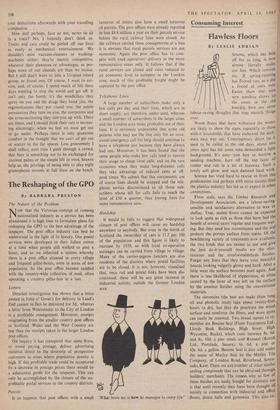The Reshaping of the GPO
Now that the Victorian concept of running . nationalised industry as a service has been abandoned it is high time to formulate plans for reshaping the GPO to the best advantage of the taxpayer. The post office industry can best be understood in the light of its history. Our postal services were developed to their fullest extent at a time when people still walked to post a letter, and so we inherited a system whereby there is a post office situated in every village and frequent pillar-boxes, even in areas of low population. So the post office became saddled with the country-wide collection of mail, often operating a country pillar-box at a loss.
Letters Detailed investigation has shown that a letter posted in John o' Groat's for delivery in Land's End cannot in fact be delivered for 3d., whereas a letter from Westminster to the City of London is a profitable consignment. Moreover, receipts originating from the smaller country post offices in Scotland, Wales and the West Country are less than the receipts taken in the larger London post offices.
On inquiry it has transpired that some firms, to avoid paying postage, deliver advertising material direct to the doorstep of prospective customers in areas where population density is high. If this profitable trade could be recaptured by a decrease in postage prices there would be a substantial profit for the taxpayer. This can only be accomplished by the closure of the un- profitable postal services in the country districts.
Parcels turnover of letters also have a small turnover of parcels. The post offices were already reported to lose £8.4 million a year on their parcels service before the rural railway lines were closed. As the railways carried these consignments at a loss it is obvious that rural parcels services are not economic. Again the post office has to com- pete with road operatives' delivery in the more remunerative areas only. It follows that if the rural services are closed and rates reduced to an economic level to compete in the London area, much of this profitable freight might be captured by the post office.
Telephone Lines
A large number of subscribers make only a few calls per day and their lines, which are in short supply, are therefore under-used, whereas a small number of subscribers in the larger cities and the London area make profitable use of their lines. It is obviously undesirable that some old persons who may use the line only for an occa- sional emergency call for help should continue to have a telephone just because they have always had one. Moreover, it has been found that the same people who make few calls tend to restrict their usage to cheap local calls, and on the rare occasions when they make long-distance calls they take advantage of reduced rates at off- peak times. We submit that this uneconomic use of scarce lines should be stopped and the tele- phone service discontinued to all those sub- scribers whose bill for calls fails to reach the level of £10 a quarter, thus freeing lines for more remunerative uses.
Hardship
It would be folly to suggest that widespread closure of post offices will cause no hardship anywhere to anybody. But even in the north of Scotland the ownership of cars is 11.7 per 100 of the population and this figure is likely to increase, by 1970, so with local co-operation messages can be carried from village to village. Many of the carrier-pigeon fanciers are also residents of the districts where postal facilities are to be closed. It is not, however, visualised that, once rail and postal links have been dis- continued, there will be any great increase in industrial activity outside the Greater London area.


































 Previous page
Previous page